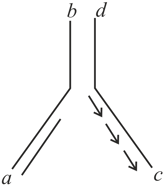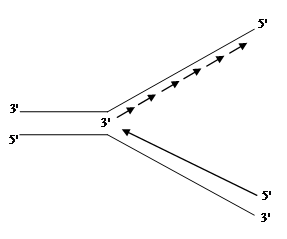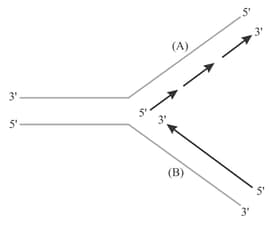Replication
Replication: Overview
This topic covers concepts, such as DNA Replication, Meselson and Stahl's Experiment, DNA Polymerase, Replication Fork, DNA Ligase, Origin of Replication, Leading and Lagging Strands, Okazaki Fragments, and Semi Discontinuous Replication.
Important Questions on Replication
Choose the enzyme that is involved in the continuous replication of DNA strand.
Which of the following enzyme plays role in only the formation of discontinuous strand of DNA?
Which of the following chemical substance is used as a source of nitrogen in the Meselson and Stahl’s experiment?
The polarity of the DNA strands from a to b and from c to d shown during replicating shown in the figure below would be:

Curling of tendrils is due to

What is the error in above diagram?
A monoclonal antibody differs from a polyclonal antibody in that monoclonal antibodies:
In Meselson and Stahl's experiment, if E. coli was allowed to grow for 80 minutes, then what would be the proportion of light and intermediate density of DNA molecules, respectively? (if E. coli divides in every 20 minutes)
During which phase of the cell cycle does replication of DNA takes place in eukaryotes?
The addition of nucleotide during DNA replication is done by:
Select the incorrect statement regarding the given diagram:

Meselson and Stahl used isotopes of which element?
Which one of the following will be the ratio of heavy, intermediate and light bands in Meselson and Stahl's experiment after two generations if replication were conservative?
Which one of the following elements is not directly involved in transcription?
Role of E.coli in replication of DNA is
i. Semi-conservative replication was proved first
ii. Polymerises approximately per second
iii. Replication time is minutes
iv. Length of DNA is
The correct answer is:
With respect to DNA synthesis, identify the correct combination of statements.
I. Always the direction of DNA polymerization is when referring to the polarity of strand being synthesized.
II. DNA ligase forms hydrogen bonds between two newly synthesized DNA strands.
III. DNA polymerase on its own cannot initiate the process of replication.
IV. DNA polymerase can catalyze polymerization in both and directions.
Which one of the following statements is correct?
DNA polymerase is required for the synthesis of
How many times can DNA replicate in a life of a cell?
